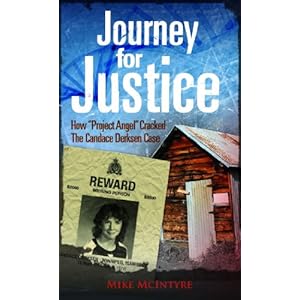Thursday, 29 March 2012
Off-topic: Journey for Justice - A review
As part of our Journalism class in Creative Communications, the program I'm attending at Red River College, we dug into a book called Journey for Justice: How "Project Angel" Cracked The Candace Derksen Case. It tells a great story about the events of the disappearance and murder of Candace Derksen, and the aftermath, describing the trial of Mark Grant, the murderer of Candace, and the struggles the Derksen family had to overcome, having lost a family member.
It's time to look at the book itself.
Mike McIntyre re-wrote this remarkable story, shifting between two different styles of writing throughout the book, so it seemed. The first part of the book consisted of retelling the Derksens's experience of Candace's disappearance in a novelistic and very attention-grabbing way. I felt like I couldn't put the book down. It was as if I was right there with the family, traveling back in time. It was a feeling that kept me gripped to the book until the end. At least I thought so.
The second part of the book pulled me back into reality and it started to feel more like I was reading a copy of the Free Press, from front to back, just about Candace Derksen. Not that it was bad or anything, but I felt the appeal of the book fading away, once I went deeper into the second part. More quotes were used as dialogue for the story, and made the story just seem more like a long article.
The third part with the Mark Grant trial wasn't really any better, I have to admit. While I could easily picture the events in the courtroom and everything else in between, I still felt somewhat distant from the action, as if I was still reading this newspaper in front of me. It was great of McIntyre to include reactions of the occurrences, especially from Wilma Derksen, Candace's mother, as she wrote about her feelings on her blog. It also was great to include the recruiting efforts for the jury, because I don't think many people know how the law system works, and including that in Journey for Justice is a great way to show what exactly happened in the courtroom.
The last part was a slow, yet good afterburner, involving the events after the conviction, and the memorial and dinner event, held in honour of Candace. Hearing testimonies from the people close to Candace was shaking me a bit on the inside, even if I didn't know any of the people going to the podium that night. Closing the book with some final words from Wilma Derksen was the icing on the cake to me. Final words should always leave a good impression on the book, and I believe Mrs. Derksen's words have done justice for that.
---
Now, a more technical analysis.
I believe the book would have worked better, if McIntyre had kept the story in a novel-like fashion, and tell the whole story that way. But this could be, because he is used to writing newspaper articles and he used these skills to write the book. The second and third part could have worked better if they were written like a novel, like it was in the first part, and I wouldn't have put the book down after starting to read the book. Otherwise, the journalistic writing style did not feel like it was working well with the book, because it just didn't feel like it fitted. The sudden shift in style made the book less appealing.
Journalists can learn quite a few things from this book, including keeping the writing style consistent and how to make the details work in favour of the book. For example, McIntyre kept the course of the events in order of occurrence, going chronologically up, starting with the day Candace disappeared to the still ongoing trials of Mark Grant. Some stories work with going back and forth, using flashbacks and such, but I don't think it would have worked for this book.
I think many journalists would love to speak up against the convicted and trash them in the main media stream, so I also believe many could learn how to keep the story in a neutral position. I believe it was really challenging for the author to write about the family coping with the loss, and not go into a rage against the one who did the wrongful thing. In a professional environment, it is important to stay calm and write neutrally. You won't get in trouble for that.
This book was probably McIntyre's most challenging work. Compared to his work he does for the Free Press, it somewhat felt like the writing he had to do was a bit out of his element. He has a blog called "Mike on Crime" and his writing there is great and enjoyable. But I'm not here to make any judgements on his writing style. I just think that his switch between styles in the book didn't work as they should. Journey for Justice is a book, and in my honest opinion, McIntyre should have stayed with one writing style from beginning to end, to keep it consistent, just like he keeps up in the Free Press and his blog.
Overall, I would have to say the book was definitely a great insight to the Candace Derksen case. It had lots of details included and told the story in as many perspectives as possible, and it kept the family element at a high importance, which made me find this book touching and outreaching
It's worth a read. Check it out.
Subscribe to:
Post Comments (Atom)

No comments:
Post a Comment